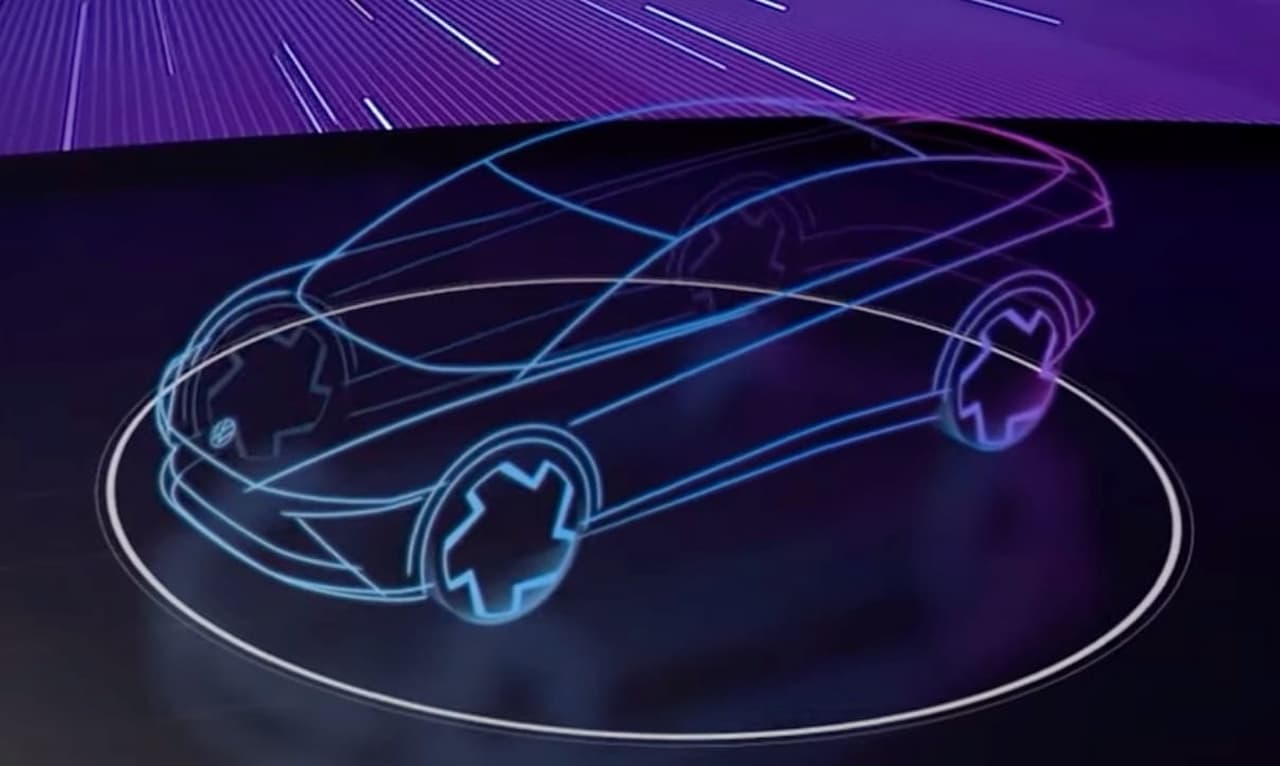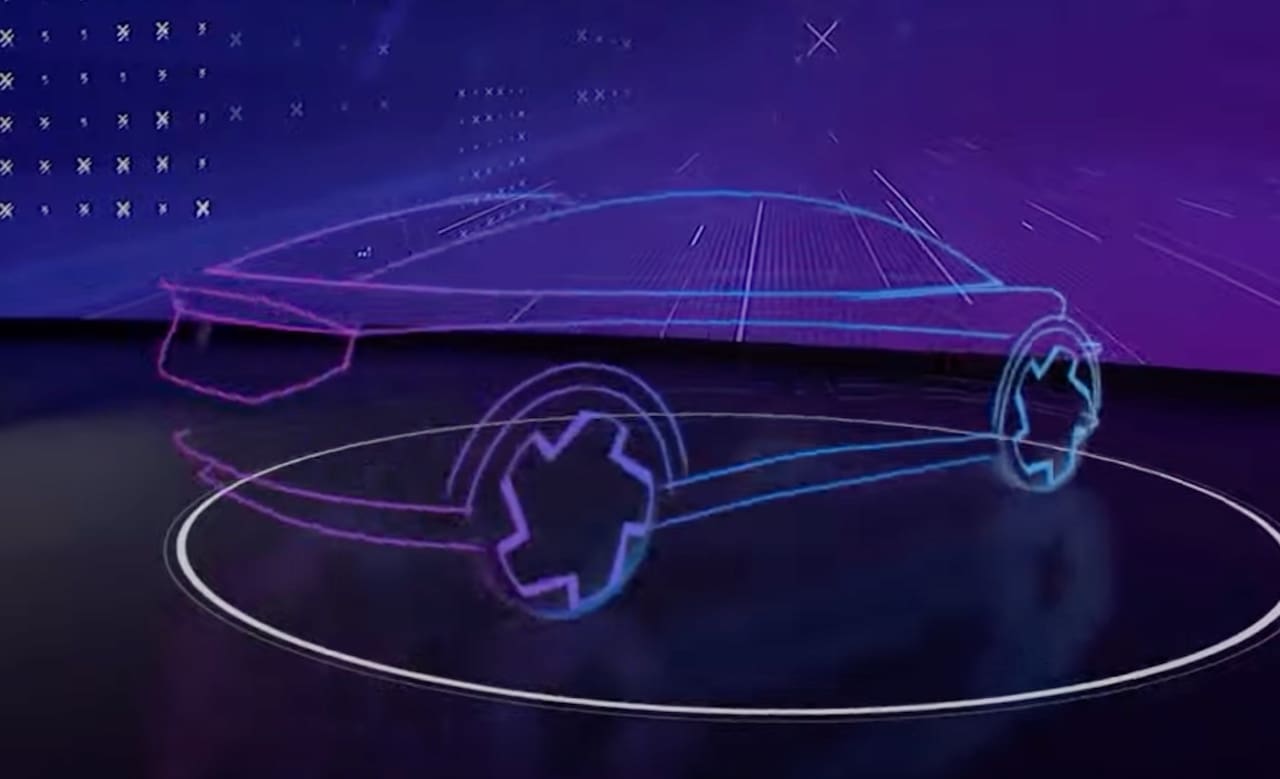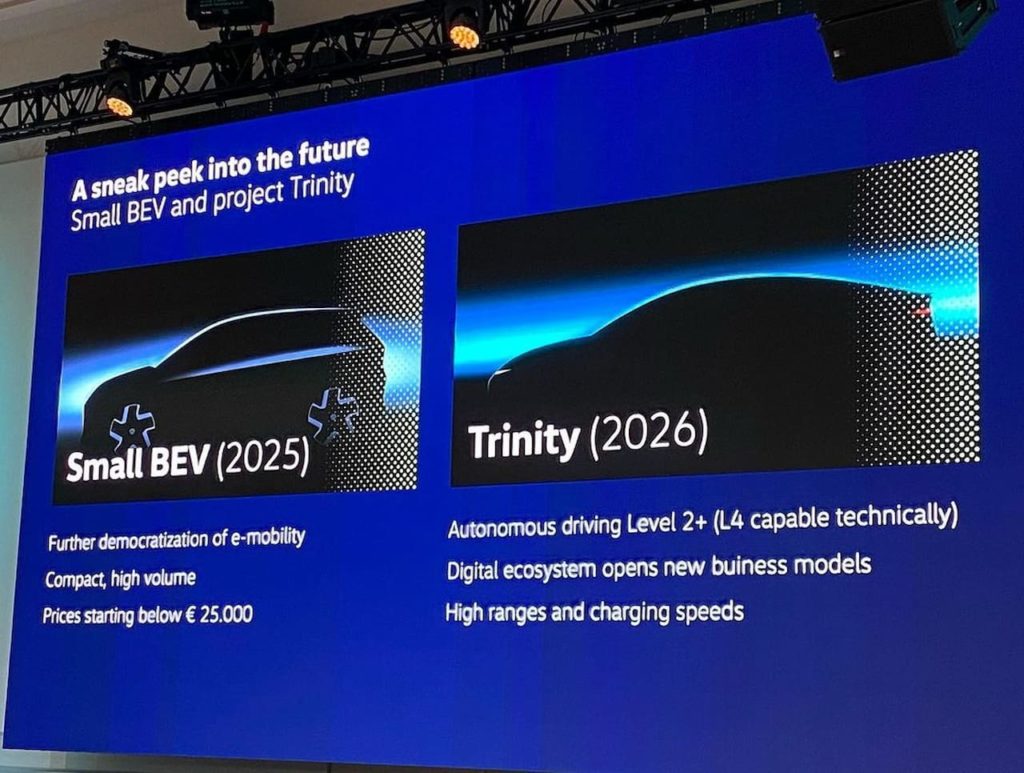Update: ‘Design,’ and ‘Level 4 Autonomous Driving,’ ‘Price,’ and ‘Production & Release Date’ and ‘800V architecture’ sub-section of ‘Specifications’ updated.
In the words of former Volkswagen Group China CEO Ralf Brandstätter, the VW Trinity is a lighthouse project and the company’s dream software car. Here’s what we know about Volkswagen’s ambitious future electric car which has seen a fair share of changes since its inception.
Design
Volkswagen had said in 2021 that the VW Trinity project car will be a “flat, sporty sedan” that would set new benchmarks in terms of range, charging speeds, and digitalization. However, media reports later suggested that the company has changed course, and is instead building an SUV.



In its report published on May 2, 2023, Autocar said that the Trinity has been reborn as a “premium-market crossover-cum-SUV.” The vehicle will be positioned between the Tiguan and Touareg, featuring the company’s most advanced software and drivetrain components.
Former Auto Bild editor-in-chief Tom Drechsler saw the covered vehicle, which we now understand was the original design proposal, while interviewing Brandstätter in Walhalla in November 2021. Walhalla is Volkswagen’s windowless secret room at its design center in Germany. The Autocar report notes that the development targets that were outlined by Brandstätter are similar despite the change in the shape.
According to a report Handelsbatt published on August 13, 2024, the VW Trinity will be a compact SUV. It’s not referring to the SSP-based successor to the ID.4, though, as it states that EV as a separate model scheduled to arrive slightly earlier.
Scalable Systems Platform (SSP)
Current Volkswagen EVs sit on the MEB electric vehicle platform. However, Trinity will be based on a Scalable systems platform or SSP. SSP is the Volkswagen Group’s mechatronics platform that’s being developed for next-gen pure electric, digital, and highly modular EVs from every group brand.
SSP will be the successor to MQB, MSB, MLB, MEB, and PPE platforms. The VW Trinity will be the first true SSP model. The development of SSP is taking place in Wolfsburg, Germany, which is home to Volkswagen Group.
Development
Volkswagen will execute the Trinity using a new development process that is more harmonious and reduces the time taken by 25%. Vehicle projects will take 40 months from start to completion in the future, a significant improvement over the current time of 54 months. Volkswagen is developing a new R&D center, the Sandkamp Campus. It will house 4,800 engineers and come at an investment of USD 900 million.
Level 4 Autonomous Driving
Former Volkswagen Group CEO Dr. Herbert Diess had said that the VW Trinity would bring Level-4 autonomous technology to the mass market segments. CARIAD developed VW.OS and VW.OS v1.2 systems are integrated into PPE platform cars. Initially, SSP cars were supposed to have VW.OS v2.0. Now, Volkswagen is likely to utilise a software platform co-developed with Rivian.
The new EV will have Level 2+ autonomy as standard. At a later stage, it will be possible to upgrade, but Level 4 autonomous driving will likely be a paid subscription.
Specifications
With Trinity, we are revolutionizing the all-electric mobility experience. We are setting new standards – in range, charging speed, and connected driving experience.
Ralf Brandstätter, former CEO, Volkswagen (Annual Media Conference 2022 on March 16, 2022)
Dimensions
Brandstätter revealed a few specifications, some of which seemed targeted figures, of the VW Trinity during the Auto Bild interview. He said that the car, presumably in its production version, will measure around 4.70 m (185.0 in.) in length and offer seats for five occupants. Given that the shape has changed since this interview, the proportions would be different to the one that Brandstätter described, though the length is expected to be more or less the same.
Performance and range
The Trinity’s WLTP range will be more than 700 km (435 miles), Brandstätter revealed during the Auto Bild interview. A 0-100 km/h (0-62 mph) sprint will take less than 5 seconds.
According to an earlier Autocar report, Volkswagen could use a cobalt-free battery pack (like LFP, for instance) in the Trinity. However, the company would need to ensure achieving performance and range standards with such chemistry is comparable to an NMC battery pack, if not better. The VW Trinity would also have the unified cell concept for the battery pack.
800V architecture
The charging power will be much higher than what current VW EVs offer, as Brandstätter wants the flagship EV to charge as quickly as refueling an ICE vehicle.
The latest Volkswagen models like the ID. Buzz and ID.7 are available with a 400-volt, 86 kWh (net) battery pack that supports charging at up to 200 kW and charges from 10% to 80% in 26 minutes. Volkswagen Group’s luxury brands Audi and Porsche use an 800-volt, 95 kWh (net) battery pack in the e-tron GT and Taycan, respectively, which supports charging at up to 320 kW and takes as little as 18 minutes for a 10-80% charging session.
On March 18, 2022, in an interview with Auto Zeitung, Brandstätter confirmed a highly anticipated specification of the EV. When asked when will the Volkswagen brand introduce 800-volt charging technology, he revealed that the Trinity will become that model.
On-demand feature activation
The future project aims to eliminate production complexities. The SSP cars would have fewer variants and standardized hardware. Customers would have the option to choose from a plethora of features that enable or disable them at their convenience. The VW Trinity would mark the beginning of highly software-based EVs.


The subscription model will be extensive. Imagine paying extra for Spotify Premium; in the same manner, future VW cars will have features that can be activated on-demand — either for trial or even a complete purchase. This could range from buying a technical upgrade to upping the charging capacity to, say, 300 kW or higher.
Price
The base VW Trinity price will be EUR 35,000 (USD 38,869). That’s the target Brandstätter revealed during the Auto Bild interview. However, considering that the company has repositioned the future model between the Tiguan and Touareg, it could be priced at close to EUR 55,000 (USD 61,080). In Germany, the prices of the VW Tiguan, VW ID.4, and VW Touareg start at EUR 38,250 (USD 42,479, EUR 48,635 (USD 54,012), and EUR 73,765 (USD 81,920), respectively.
Production & Release Date
When Volkswagen announced the Trinity in 2021, it planned to introduce it in 2026. In 2022, the company postponed the launch to 2028 because of software issues. The recent Handelsblatt report states 2032 as the new release date, citing weakening EV demand and continued software problems at VW as the reasons behind further delay.
New manufacturing techniques
On September 29, 2023, Volkswagen Passenger Cars confirmed that the Trinity project will be produced at the Zwickau plant.
As things stand today, the Trinity vehicle project originally planned for Wolfsburg will go to the Zwickau plant.
VW Passenger Cars in an announcement on September 29, 2023
On March 31, 2022, Reuters said in a report that Volkswagen will reduce the number of components in vehicles by several hundred and adopt techniques like large die casting to speed up production times. Launching EVs in fewer variants is among the solutions to slash production times. The implementation of these measures will benefit the Trinity project model. Volkswagen wants to cut production time to 10 hours per vehicle. Currently, they take 30 hours to produce one ID.3.
TopElectricSUV says
The VW Trinity will likely be a highly efficient, highly digitalized, ultra-long-range electric car. If executed well, it would result in one of the most futuristic eco-friendly cars to come out of Germany for the masses. However, what is not certain when the project will be ready, as it feels unrealistic to expect it before the end of the decade.
Featured Image Source: Volkswagen

I’m an automotive journalist with 4 years of experience in magazine and digital publishing, content creation, social media management and YouTube. A car enthusiast who converted my passion into a profession!

Comments are closed